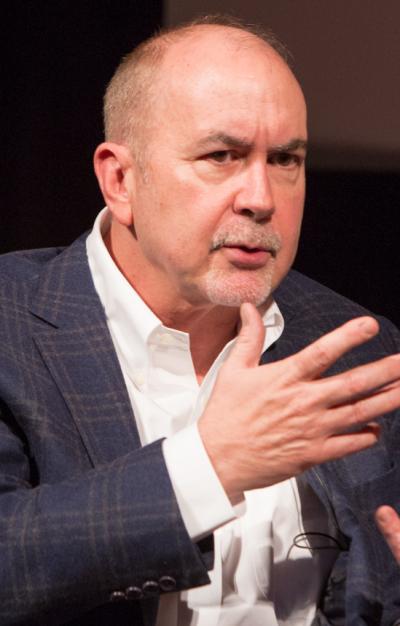
Interview: TERRENCE WINTER (VINYL - Creator and Executive Producer)

VINYL
TERRY WINTER
Creator and Executive Producer
Q: You and Martin Scorsese have worked together several times now.
What do you think it is about your scripts and his direction that work so well together?
A: He was the guy that first inspired me - his films, particularly Taxi Driver, were the reason I started writing in the first place. So, tonally, I just felt like I was always in sync with him.
I think we have very similar sense of humour, and a similar sense of storytelling style in certain ways. We laugh at the same things, we are inspired by the same things, and I think it just was a very easy collaboration in that sense.
When I wrote The Wolf of Wall Street, one of the first questions I asked him was: how do you see this in terms of the tone? And he said, well, I kind of look at it like it could be a companion piece to Goodfellas or Casino.
And I went, oh, great, I can write a version of that. and that’s what I did. And then, Boardwalk was a little different, but again, it’s just really a question of getting on the same page creatively.
Q: All three of them are also about empires crumbling - what is it about that idea that appeals to you both so much?
A: It’s always more interesting to me when, somebody is sort of at the end of something, when the world around them is falling apart - and in Richie’s case, it really does fall apart at the end of the pilot- rather than everything going great and you being at the top of your game. Certainly, people under that kind of pressure, for me, are always more interesting to write.
Q: Why do you think audiences respond to it so well?
A: I think it’s something we all relate to. Very few of us that have idyllic lives where everything’s going great – it’s a misery loves company thing – you know what it feels like, when things are going wrong, or you are struggling to get out of something. It’s like Rocky - everybody can relate to it, whether you’re a boxer or not. You know what it’s like to be the underdog and take a shot at something and try to hang on for dear life.
Q: How did you first get involved in the project?
A: I first got involved in 2008, and there had already been several versions of the feature film script that weren’t working. I wrote my versions and we got one that we felt, oh, this is it. And everybody got excited about it and the studio was strongly considering moving ahead…and then the economy collapsed in 2009.
And suddenly the phone stopped ringing. And it became very clear that they were not going to make a three-hour epic period piece that spanned 40 years.
But once we had that definitive information, I said, you know what, great, let’s reinvent the wheel. What about a TV series?
But that meant we had to undo everything we did - I had to start from square one again, take this character, put the show in one era as opposed to 40 years. So we said, what’s the most interesting time period? And for me it was 1973. And then I had to come up with a completely new story.
We didn’t shoot the pilot until the summer of 2014, so I had already been involved with it for six and a half years at that point. So, but you know, things work out for a reason, and we’re here today, and it’s all good.
Q: Why was 1973 the particular year you chose to locate it in?
1973 was the year that punk, disco and hip hop were all invented within about a six month period of each other, within five miles of each other in New York City.
The first hip hop party in the Bronx happened that summer – the first time anybody played two records at the same time, and one record blended to the next in the middle of that beat.
And that’s when the New York Dolls gave way to the early punk bands - Television and the Ramones came about eight months later. So it was a really interesting, fertile, time period in music, and that was irresistible.
Q: How much did you already know about the music scene at that time?
A: I certainly knew a lot about the punk world, lesser so about hip hop and the disco beginnings, but I read a lot about it, and by the time I was writing the feature, I knew that was the year that was really interesting to me.
I was 13 living in Brooklyn at the time. I was desperate to explore Manhattan, but it was about a year before I was brave enough to get on the subway and go to Times Square and wander around by myself. It was really scary and exhilarating, and just a really different city than it is today - crazily different.
But you just always felt that adrenaline pumping - it felt like anything could happen at any time, and it did.
There was a lawlessness in it that lent itself to personal freedom, but it was also like the wild west. The crime rate was terrible - I think there were something like 2,000 murders in 1973 in New York. Last year there was 162. That’s 92 percent less - that’s crazy.
And then just take that number across everything – muggings, shootings, robberies, all kinds of stuff. Your car was broken into all the time - you would leave the door open, hoping they wouldn’t break the window, at least, if they could just go in and see that there’s nothing in there.
I don’t miss having to look over my shoulder every five minutes, I really don’t. As much as people want to romanticize, it - oh, Times Square was so cool. It really wasn’t. There was nothing cool about being mugged at knifepoint.
I prefer this version; I can write about the other version.
Q: But is there something that is lost? Are underground scenes more difficult to establish now?
A: Yes, there’s less of a sense of music mattering. In the 1970s, people were writing protest songs about the Vietnam War, and young people were involved in politics. Now, young people couldn’t tell you who the Vice President is.
It’s really sad. We’ve slowly become completely distracted by the Kardashians and are just completely looking the other way when it comes to what’s going on in the government.
And there’s also the insidious idea that if you question anything about the government: “you don’t love America.” What are you talking about? Just because I want to make something better, doesn’t mean I don’t love it.
Q: Are any of the characters in Vinyl based on real people that you’ve known or come across?
A: Richie is an amalgam of about ten different record executives I’ve read about, and he’s also part Bobby, too – he took that character and then created his own.
The other characters are written but then sort of take on a life of their own. Whether or not they’re inspired by particular people, they’ve now become real people themselves, even though they’re fictional characters.
That makes it more freeing - I don’t have to be beholden to a specific person’s life; I can just make up this person.
Q: How much did Mick Jagger have input into the authenticity of the music scene at the time?
A: Oh, very much. He’s obviously lived through it and been there literally on the stage at the time it happened, so he’s a huge resource in terms of keeping us real and honest with the music and the performances and anything to do with recording or artists dealing with the record company. He’s a wealth of information, as you can imagine.
One specific example is the input he would give in things like the prep for a show, especially for a lead singer – how much you have to take care of yourself. It’s sort of like an athlete preparing for a game. All everyone else sees is the groupies and the partying, meanwhile the lead singer is sipping tea and making sure he doesn’t speak too much.
It’s work - it’s show business, it’s a business. Of course, it looks all crazy and fun and it is a lot of the time, but there’s a real business here and a lot of rehearsing and everything is down to a specific science.
Q: The level to which it is purely a business, which you very much portray in the show, is a little depressing, really, isn’t it?
It is, yeah. Unfortunately that’s the world, certainly as it existed in 1973, and, I’m sure to a lesser extent, or maybe the same extent now.
If you were a new artist and you didn’t have a lot of power or great representation, you would get a really shitty deal from a record company. As Richie breaks it down in the pilot: we basically break even on everything, because everything’s coming out of the artist’s deal, so unless you’ve got a lawyer who’s watching out for you – and as he even explains, most lawyers want to work for us, so they don’t push too hard - it’s kind of rigged in the favor of the record company. You’ve got to really sell a gazillion records to make any kind of money.
Sports figures, or boxers, you know, traditionally get killed too.
It’s very rare that you see a professional boxer who comes out the other end financially secure. Even the biggest champions, it’s very rare.
Q: Do you think that has something to do with class, because, in things like boxing, things like music, the stars tend to be working class?
A: Yes, they do often seem to be unsophisticated people who are taken under the wing of people who are devious and sharp, who are lying to them and making them feel like stars on the one hand, and then taking everything from them at the same time.
Q: Bobby’s character, Richie, is an amazing creation. Is he an antihero?
A: It depends on how you look at him. I look at a guy like Richie Finestra and he makes me laugh. But I can also understand people looking at him and being horrified, and thinking he is crazy and scary. But I grew up with a dozen Richie Finestras, and then they were a lot of bark and no bite, most of them - they’re loud and abrasive and silly, and occasionally violent, but going back to Martin Scorsese and I having the same sensibility, we’ll laugh at a guy like that, those guys are funny to us. To me, Richie is enormously likable, even when he’s being mean to people. He’s still funny.
Q: In that great line in the pilot about it being his story, clouded by bullshit – are you deliberately setting him up as an unreliable narrator?
Yes, absolutely, and that’s sort of by design. That’s my wink to the audience, saying: don’t take this so seriously, don’t write me emails about it, “that record was actually the B side of the album.” It’s like, Richie doesn’t remember.
Richie kind of remembers what happened, but it’s fine, and just roll with it and have fun - this is a show about rock and roll, and rock and roll’s supposed to be fun. It’s all pretty close to reality, close to when they did happen in the world, so just enjoy the show.
It’s a great get-out clause.
Q: I understand there will be more flashback scenes – how far will we be travelling back?
So far we’ve gone back to the 1950s. We also spend time in the New York 1960s, with Andy Warhol and the Velvet Underground world in 1965 and 1966, which was really interesting.
But Richie was born in the 1930s, so, you know, he came up in the 1940s and at some point maybe we’ll see him as a kid. There’s some great music that he refers to in the pilot that he loved - Louis Jordan and different swing bands and I’d love to be able to pick that stuff too.
Q: You’ve recreated a lot of original venues for the show – can you tell us a few?
A: Max’s Kansas City was really fun to recreate, a block and a half away from the original, right around the corner.
All the people in the neighborhood were like, what’s, what’s going on, are they opening…? No, it’s a TV series.
We’ve shot in Coney Island, which was fun, at The Cyclone, and we recreated a place called The Dom, which was a club in the East Village, where the Velvet Underground played. We also recreated the Academy of Music, which later became The Palladium on 14th St.





